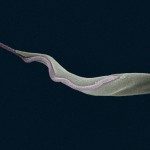Link to Pubmed [PMID] – 7635519
Immunology 1995 May;85(1):26-32
(NZB x NZW)F1 (B/W) mice spontaneously develop a lupus-like syndrome characterized by an increased level of autoantibodies in old mice. We analysed the role of T cells in the regulation of anti-DNA antibody production by B cells in vitro as a function of age. In cultures of old mouse T and B cells, IgG and IgM anti-DNA antibodies were synthesized at high levels, in contrast to consistently lower amounts, particularly of IgG, measured in cultures of young mouse cells. Addition of young mouse T cells to old B cells inhibited IgG, but not IgM, anti-DNA production, whereas T cells from old mice stimulated IgG synthesis by young mouse B cells. Addition of supernatants harvested from concanavalin A (Con A)-stimulated T cells to B-cell cultures induced similar effects. Therefore, we evaluated possible modifications of lymphokine synthesis compared to that of the healthy NZW parent. T cells from old mice were able to secrete normal levels of interferon-gamma (IFN-gamma) and interleukin (IL)-10; however, secretion of IL-2 and IL-4 was dramatically decreased. Semi-quantitative polymerase chain reaction analysis of constitutive RNA messengers showed increased IFN-gamma levels in young and old B/W mice, and normal IL-10 mRNA levels in young and higher levels in old mice. Constitutive IL-2 and IL-4 mRNA were detected only after Con A stimulation and their levels decreased in old compared to young B/W mice; in particular IL-2 mRNA was considerably lower in old B/W than in control NZW mice. Taken together, these results suggest that, despite constitutive T-cell abnormalities, young B/W mice are able partially to control their lymphokine production, whereas aged mice exhibit a deficient synthesis, associated with an increased capacity to produce IFN-gamma.

